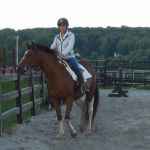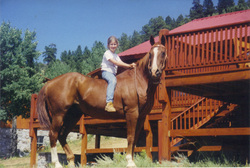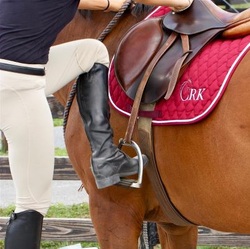Many of us have horses who go too fast when we ride – it may be out of nervousness, excitement, or very commonly lack of balance. Some horses can also get quick out of discomfort – so as with many behavior issues – always rule out physcial problems first.
To correct a horse that goes too fast, the answer is rarely bigger bits or stronger equipment. Instead, we need to be slow the horse down then reward what we wanted – the horse going slower – by releasing pressure, not continuing to “hold” the horse to keep him slow. You may have to work on other components as well, such as your horse’s balance and your own position in the saddle to help him maintain the slower pace, but the key is that release when your horse does the right thing by going slower. If your horse is naturally very forward moving, it may take many reminders telling him to slow down, but once he learns that this is what you want, he can respond confidently to your “slow down” cues.
To quote Angelo Telatin during a recent clinic, “Riding is not about pulling, kicking, turning, it is about rewarding good behavior by dropping the tension in your body.”
Riding a horse that goes too fast can be a scary experience, causes fear and anxiety. For tips on how to handle these emotions visit my Calm & Confident Free Resource














8 Responses
Fabulous videos! Thank you, Callie, for all your time and effort in sharing your talent. Much appreciated.
Thanks Cheryl!
Hi I have seen your video on how to slow down a fast horse and it was very helpful. But I have a Arabian/Friesian cross, she is naturally fast and is always wanting to speed up more. How would I be able to slow her down to a more comfortable pace without affecting her natural rhythm ? -Erin
Hi Erin,
I would work with circles and transitions to help her learn to translate that energy into more impulsion instead of speed forward. Simple lateral work, such as teaching bending, and moving the shoulders and haunches can also help her get more control of her body and teach her to use her hind end more when she moves (more hind end means more lift and impulsion). Hope this helps! Callie
Thanks a lot Callie for sharing this valuable information. I greatly appreciate your post. I also believe that one should have quality clothing and horse acessories too while riding for a safe and professional riding. I get all my riding stuffs from Ride 4 Less.
What if she gets quick at the canter going down a line? I am starting to feel more success slowing down at the trot, but I really feel like I’m just bracing to slow down the canter. It starts to feel like an argument because I want to give her a release, but she isn’t slowing down.
great vid, thank you, always awesome!!!!
Thank you Callie for another excellent teaching video. I especially appreciate how you break down and demonstrate each skill, and explain why it matters. A lot ‘can do’ but not teach. You do well at both .